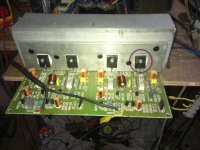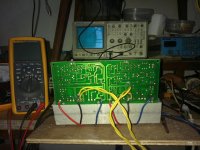This amplifier module is bought from local market and I have made couple of them running successfully for my friends.
But this one had given me big time trouble.
The Mosfet is IRFP250 (quasi complimentary I believe) the circled one heats up within 3 or 4 minutes, the current drain at start up is 80 mA which rises to 500mA within 5 minutes and it goes up. the quiscent control transistor which is Bel187 was found bad initially. there is a mild hissing noise from loudspeaker which increases gradually with the current rise with amplitude of couple of hundred milli volts.
I have replaced all the semiconductor including the Mosfet but there seems no change in its weird behavior. Now all that remains is handful of capacitors and resistors which I already measure on board comparatively to adjacent channel which is working perfect.
Waiting for advice
But this one had given me big time trouble.
The Mosfet is IRFP250 (quasi complimentary I believe) the circled one heats up within 3 or 4 minutes, the current drain at start up is 80 mA which rises to 500mA within 5 minutes and it goes up. the quiscent control transistor which is Bel187 was found bad initially. there is a mild hissing noise from loudspeaker which increases gradually with the current rise with amplitude of couple of hundred milli volts.
I have replaced all the semiconductor including the Mosfet but there seems no change in its weird behavior. Now all that remains is handful of capacitors and resistors which I already measure on board comparatively to adjacent channel which is working perfect.
Waiting for advice
Attachments
So far, you may have a wiring, soldering, parts or oscillation fault associated with the circled Mosfet and/or the quiescent controller. You have a second working amplifier for comparison so, other than detecting oscillation, it's relatively easy to compare all quiescent voltages before it overheats.
It seems likely that the problem still lies with the bias controller. Is it also fitted to the heatsink so it can regulate properly? Do you measure the same quiescent current in either large resistor? Try a different low-gain type there (they are not critical as long as physically and electrically similar).
Post the schematic and foil pattern + parts overlay (or link if they are copyright) so we can perhaps be more helpful. Meantime, locate an oscilloscope that has >50Mhz bandwidth and AC couple that to the output to check for signs of oscillation. This could be in the 10s of MHz with mosfets.
It seems likely that the problem still lies with the bias controller. Is it also fitted to the heatsink so it can regulate properly? Do you measure the same quiescent current in either large resistor? Try a different low-gain type there (they are not critical as long as physically and electrically similar).
Post the schematic and foil pattern + parts overlay (or link if they are copyright) so we can perhaps be more helpful. Meantime, locate an oscilloscope that has >50Mhz bandwidth and AC couple that to the output to check for signs of oscillation. This could be in the 10s of MHz with mosfets.
Ian,Thanks for that reply .
I was about to post the foil side because I did not see any reply since long. I wonder if this forum DIYA has become slower or my subject is too wierd.
Here is the attached pic.
Yeah I got te 2465b on my bench.
I have tried to figure out the oscillation but failed, it may be due to the reason that I am not so very good at tracking oscillation in amps or some other reasons
as mentioned by you , the quiescent current does drifts a lot and voltage drop across two of the resistor along with the zenner diode concerning the gate of FET does show considerable voltage difference after heating up compared with other channel. I have tested the continuity of zenner which looks fine. where as the "positive" side remains quite cool with similar voltage readings across most of the components
The point is, at turn on everything voltages same but after warming up i.e when fet is heating up everything is going going haywire . Looks like I am feeling bit scared to do any thoughtful measurements while something is being cooked on other side.
So I thought let me get expert advice before big bang and smoke.
I was about to post the foil side because I did not see any reply since long. I wonder if this forum DIYA has become slower or my subject is too wierd.
Here is the attached pic.
Yeah I got te 2465b on my bench.
I have tried to figure out the oscillation but failed, it may be due to the reason that I am not so very good at tracking oscillation in amps or some other reasons
as mentioned by you , the quiescent current does drifts a lot and voltage drop across two of the resistor along with the zenner diode concerning the gate of FET does show considerable voltage difference after heating up compared with other channel. I have tested the continuity of zenner which looks fine. where as the "positive" side remains quite cool with similar voltage readings across most of the components
The point is, at turn on everything voltages same but after warming up i.e when fet is heating up everything is going going haywire . Looks like I am feeling bit scared to do any thoughtful measurements while something is being cooked on other side.
So I thought let me get expert advice before big bang and smoke.
Attachments
Bias transistor thermal tracking is missing.
To be honest I dint get what you meant .
the other side is working perfectly good and before this amp 3 other same make amps are running quite well since last 2 years. to my understanding they are more or less clones if component tolerance are ignored.
Woo-Hoo I figured it out.
It was one the input differential MPSA92. the voltage drop across the CE did let me recheck it. this time I tested in X10000 range of multimeter and voila one of the transistor had a different resistance which I belive should be changing when it gets warm.
Thanks to all for their time and consideration especially Ian and Workhorse.
It was one the input differential MPSA92. the voltage drop across the CE did let me recheck it. this time I tested in X10000 range of multimeter and voila one of the transistor had a different resistance which I belive should be changing when it gets warm.
Thanks to all for their time and consideration especially Ian and Workhorse.
Freax , yes even I was also suspecious about the same but when I failed to find any kind of spurious oscillations other than water fall noise which is too complex for an oscilloscope (I remember making noise source from a single bjt in reverse coupled in school days and it sounded similar)my belief on faulty semiconductor kept solidifying that could be the reason even at the end I dint care to check any of the cap or resistor . of course I was bit disappointed and looking for the last resort to test those too but I was fortunate.
- Status
- Not open for further replies.
- Home
- Amplifiers
- Solid State
- Negative side Mosfet heating up with mild hissing

